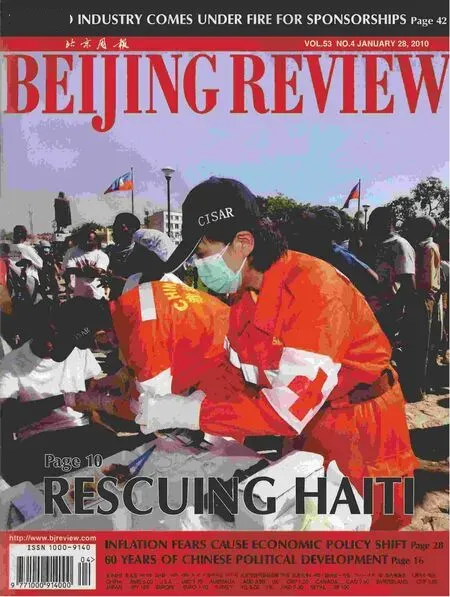Should Tobacco Sponsorship Of Education Be Banned?
After the massive earthquake inSichuan Province in May 2008, a primary school funded by a tobacco company was set up in the quake-stricken area. On the roof of the school building stands the signboard“Sichuan Tobacco Hope Primary School.”A slogan engraved on another board reads,“Tobacco helps your success.”
Statistics show in China, there are 17 Hope primary schools named after sponsoring tobacco companies.All of them are in economically backward areas.
Tobacco control activists say the practice exerts negative social impacts and it is necessary to limit tobacco companies’ sponsorship of education. They stress that tobacco companies, by sponsoring education,want to build up a positive image for themselves and promote the sales of tobacco products. Therefore, only a comprehensive ban on tobacco advertising, promotion and sponsorship will reduce consumption, especially among young smokers.
Tobacco companies, however,argue that the sponsorship of education shows their passion about social responsibilities, which should be encouraged.
Some people are also worried that if tobacco companies retreat from supporting the Project Hope for developing education in poverty-stricken rural areas, it will be difficult for concerned schools to survive the shortage of operational funds and if they cannot, then students will be the biggest victims.
Sugarcoated poison
Zhou Huan (www.jiaodong.net): Early this year, a 2-yearold baby in southwest China’s Chongqing was surprisingly found to be skillful at smoking. It was later found the baby took up the smoking habit under the influence and allurement of others. This example shows how big the external environment’s impact is on a child. What will happen to young students when tobacco advertisements are on campus?
Tobacco companies might argue the sponsorship of education shows that they are undertaking social responsibilities. In fact, they are trying to build up a positive self-image while making huge pro fits. Real charity is never pro fit-oriented.
Though tobacco companies’ financial support has, to some extent, helped educational development in underdeveloped areas, their ill-motivated charitable activities are mostly harmful. Once profit-oriented sponsorship begins to prevail in the education sector, it will not only undermine charity efforts but also in flict a negative impact on students.
Wang Yanming (Beijing Times):In many countries, tobacco companies are barred from sponsoring entertainment and sports activities, let alone funding schools.In China, however, there is no legal ban on outdoor tobacco advertising although the country has ratified the WHO Framework Convention on Tobacco Control.

I do not deny tobacco companies’ efforts to undertake social responsibilities, but only that they should do so in acceptable ways.The primary social responsibility of tobacco companies is to warn people of the harm of smoking and to encourage the youth to stay away from tobacco, rather than erecting promotional boards in schools.
Currently, China’s highest tobacco consumption tax is 56 percent, which falls far behind developed countries where the tobacco consumption tax is as high as 60-90 percent.Tobacco companies are obligated to pay high taxes and try to support other industries by transferring profits to government financial revenues. It’s ridiculous to see them showing off “charity” through financing the construction of Hope schools.
When tobacco companies have turned to Hope schools to promote their brands, it’s high time for the government to formulate laws to curb such unscrupulous and immoral behavior.
Zhang Guifeng (Nanguo Morning Post):China’s Advertising Law forbids tobacco advertising on public occasions. The country has also ratified the WHO Framework Convention on Tobacco Control,which explicitly says that “parties recognize a comprehensive ban on advertising, promotion and sponsorship would reduce the consumption of tobacco products.” The treaty also prohibits all forms of tobacco advertising,promotion and sponsorship promoting a tobacco product by any means that are false, misleading or deceptive or likely to create an erroneous impression about its characteristics, health effects,hazards or emissions.
Obviously, naming a Hope school after the sponsoring tobacco company and erecting promotional boards with the slogan “Tobacco helps your success” violate stipulations in the WHO Framework Convention on Tobacco Control.
Imagine a young child growing up in a school where he is told tobacco is helpful day after day. Will this child develop a correct understanding of tobacco’s harm and stay away from it? Who can ensure he will not become interested in tobacco products under such an influence?
Li Xingwen (Beijing Youth Daily):From a moral perspective,tobacco companies’ title sponsorship of Hope schools is reproachable.While big cities have tightened restrictions on tobacco advertising, tobacco companies have turned to economically backward areas,particularly Hope schools that are in urgent need of financial support. It is immoral to take advantage of backward areas just because they lack money.
A medical report once revealed an experi-ment based on two groups of teenagers. One liked Formula One Racing and one didn’t.Years later, 17 percent of teenagers who watched the sport often became smokers while the proportion for those who didn’t watch it was only 1 percent. The reason was major advertising sponsors for Formula One Racing were world-famous tobacco companies.
From cities to the countryside, from adults to minors and from developed regions to underdeveloped regions, tobacco companies have consistently re-targeted their advertisements. The government should not tolerate their expansion and particularly their practice to “poison” young students.
Tobacco companies are making profits at the cost of people’s health and thus it has the obligation and responsibility to pay back society.If they are really interested in charity and social responsibilities, they should quietly leave the money behind and then quietly go away. As for the extremely lucrative tobacco companies, to build several primary schools is a piece of cake.If stringent restrictions do not come in time,they will be able to change schools into vivid advertisements of tobacco products.
A ban on tobacco sponsorship of education is necessary. Even if concerned schools confront temporary financial difficulties, it is more important to prevent the young generation from being “poisoned.”
Timely help
Li Qing (Youth Times):China really needs to increase its anti-tobacco efforts and strictly forbid tobacco advertising. However, I believe that a tobacco company, like any other individual or company, should enjoy the right and be encouraged to donate to charitable causes.Education in underdeveloped areas is in need of financial support from big companies. Thus banning economically strong tobacco companies from building Hope primary schools will cause losses to local education.
What we are concerned about is not tobacco companies donating schools,but the forms of their donations. The introduction of the WHO Framework Convention on Tobacco Control de fines“tobacco sponsorship” as “any form of contribution to any event, activity or individual with the aim, effect or likely effect of promoting a tobacco product or use either directly or indirectly.” As far as I understand, as long as the donation of a tobacco company does not directly or indirectly promote the use of tobacco products, we should not ban this charity. We should not enlarge the scope of“tobacco sponsorship” and cling to the prejudice that we cannot accept any donation from tobacco companies.
Tobacco companies may have hoped to make the most of the sponsorship of education to improve their image and eventually promote their products,as tobacco control activists have pointed out.But this problem can be solved. For example, we can welcome a tobacco company’s offer to build a school, but the school should be named by local education authorities after discussing it thoroughly and soliciting opinions from the public. The company would not be allowed to name the school, let alone display offensive promotional boards on campus. In any case, a simple ban on tobacco sponsorship is the worst choice.
Before there is a major change to policies on the industry, tobacco companies’operation and non-operation activities just have to obey existing laws and regulations.It is the responsibility of government departments concerned to prevent companies from illegal marketing.
Long Minfei (Nanguo Morning Post):According to statistics released by the UN Educational, Scientific and Cultural Organization in 2004, 126 million children in the world were deprived access to education, of whom 56 percent were girls and more than one third had never walked into a classroom. That is to say that one in every six children in the world is not receiving education and most of them are from developing countries. As the world’s largest developing country, China is also plagued by the shortage of education funds.
In this scenario, the opening of primary schools funded by tobacco companies is a positive thing since otherwise some children will be deprived of their rights to receive education. Like anything in the world, these schools have positive and negative effects.But we need to see whether negative effects outweigh positive ones. It is obvious they play an important role in improving education in underdeveloped rural areas, which should be encouraged rather than banned.Meanwhile, the government should enhance regulation on tobacco companies to ensure that they operate lawfully.
Education is a country’s foundation.A country can only become prosperous when its education becomes advanced.For the time being, as China’s government investment in education falls far below the international standard, it is wise to absorb social capital to fill the gap. As for the primary schools concerned, we should allow the tobacco companies to offer financial supports while monitoring its advertising campaigns.

Dear Readers,
“Forum” is a column that provides a space for varying perspectives on contemporary Chinese society. We invite you to submit personal viewpoints on past and current topics (in either English or Chinese).
E-mail us at byao@cipg.org.cn
Please provide your name and address along with your comments.
Cao Lin (Chengdu Business Daily):Our society hasn’t developed to the stage where tobacco should be banned. Therefore, we still have to be realistic on this issue.
Since we allow the tobacco industry to exist and develop,why can’t we allow companies in this industry to fulfill their social responsibilities? On the one hand,we allow these companies to make handsome profits. One the other,we forbid them from using revenue to improve social welfare. It doesn’t make sense. This stand can only satisfy anti-smokers’ needs to claim the high moral ground, but offers no help in solving practical problems. ■

